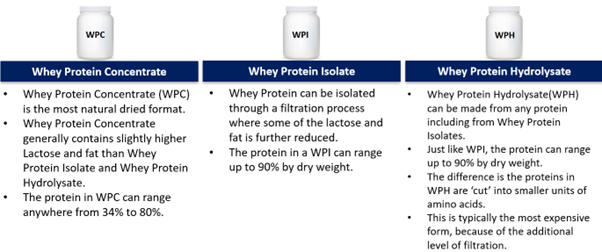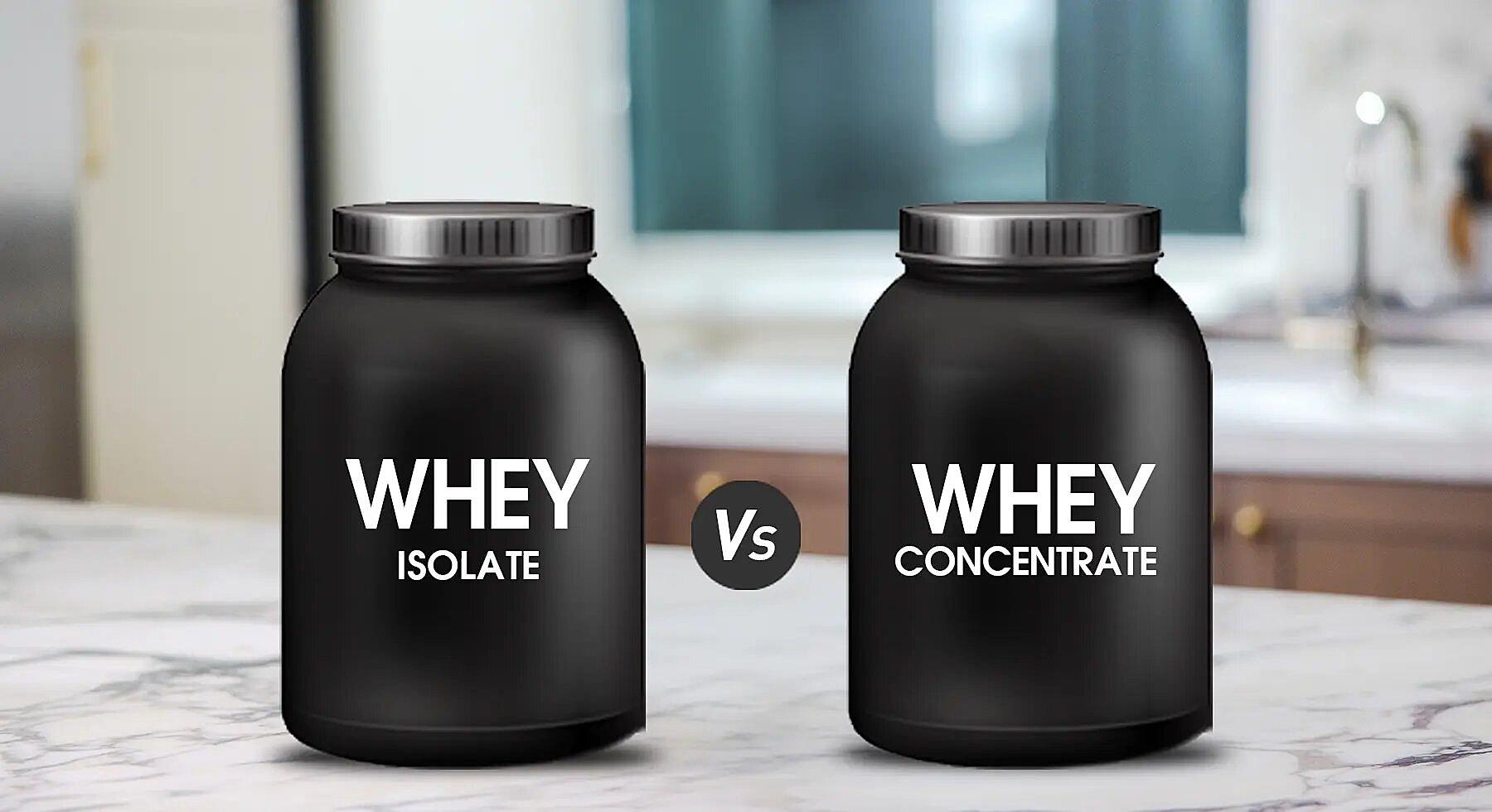 |||
5 minutes
|||
5 minutes
Whey protein Isolate and whey protein concentrate both are types of whey protein.
WHAT IS WHEY PROTEIN?
Whey is a dairy protein. An average cup of cow’s milk is predominately made up of water, but also contains about 5% carbohydrates, 4% fat, and 3% protein. From that protein, 20% is whey and the remaining 80% is casein.
How is whey protein made?
Whey and Casein are separated through the cheese making process. Either enzymes, heat or acids are added to liquid milk to begin the coagulation process. Generally, Rennet is added to milk to allow Casein and Whey to separate. The Casein will begin to thicken, which allows the Proteins to divide. From there, the liquid Whey is then pasteurized, then dried. Using different processing techniques, Whey can be made into these common forms of powder, which include Whey Protein Concentrate (WPC), Whey Protein Isolate (WPI) and Whey Protein Hydrolysate (WPH).
There are 3 types of whey proteins:-
- Whey Protein Isolate (WPI)
- Whey Protein Concentrate (WPC)
- Whey Protein hydrolysate (WPH)
The filtration process ultimately dictates the type. Generally, the more filtered the Whey Protein, the more Isolated or purified the Whey Protein becomes. This is because it’s filtering out the other non-protein components like Carbohydrates and Fat. Therefore, the main differences among the three types include the percent of Protein by dry weight, amount of Carbohydrates and Fat. The type you select depends on your dietary preference, specifications, and goals. Here are the three types simplified. There is no significant difference in the absorptions rates between WPC, WPI and WPH.

Whey TASTE & TEXTURE
The more whey is filtered, the more carbohydrates and fat are reduced. As a result, the taste and texture of the protein can change. This is because carbohydrates provide a level of sweetness, while fat provides a more cream-like texture. Therefore, Whey Protein Concentrate has a more decadent, milkshake-like taste and consistency – especially for rich flavors like chocolate, vanilla, and strawberry. Whey Protein Isolate on the other hand has less of milk notes and works well more fruity flavours used in ready to drink (RTD) whey drinks.
Benefits of Whey Protein Concentrate
There is a common misconception that Whey Protein Concentrate is not as good as other two forms of whey or that it is cheap, and none of these are true! In fact Whey Protein Concentrate is one of the most sought after type of whey due to its various applications. Let us look at some of the common benefits of Whey Protein Concentrate
- Muscle Support: Whey Protein Concentrate is a high-quality complete protein, contains naturally occurring Branch Chain Amino Acids (BCAAs), thus supports muscle recovery and muscle protein synthesis.
- Protein Content: Whey Protein Concentrate supplements are a great way of amping up protein content of your meal/snack/shake. Of course, it tends to have a little bit more carbs and fats when compared with whey protein isolate but unless you are on a calorie restrictive diet, the few extra grams of carbs and fats might not change your micros ratio too-too much!
- Decadent Flavor: gives richer, more milkshake like taste and consistency to your protein shake.
THE BENEFITS OF WHEY PROTEIN ISOLATE
If you’re wondering why you might choose Whey Protein Isolate over any other type of proteins, here are some points to consider-
If you want to control your intake of carbohydrates and fats, Whey Protein Isolate is a good choice due to its low carbs and fat content. It’s suitable for many diet types including weight management, keto, and intermittent fasting.
Like other complete proteins, it helps support muscle building when taken over time with regular resistance training, muscle recovery, and helps meet daily protein needs. Plus whey Protein Isolate typically tends to have higher protein percentage so you get more worth of your money.
During filtration process much of carbohydrates and fats are removed which removes the sweetness and dairy notes from WPI. If you want a versatile protein but don’t like drinks with a creamy, milkshake like consistency or flavour, WPI may appeal to your tastes.
Lactose is a type of sugar naturally present in the milk that gives it the sweetness. Some people are allergic to lactose, and this allergy might range from sensitivity to downright intolerance (more severe reaction). In the process of filtration much of the lactose is removed so typically whey protein isolates tend to be very low in lactose and are a more suitable option for people allergic to lactose. However, in case of any food allergy it is always advised to consult with your doctor regarding whether a certain supplement is right for you.
Take Home Message
Both whey protein isolate, and whey protein concentrate are high-quality complete dairy protein with all 9 essential amino acids. Based on your diet needs and goals you might choose to go with one or the other. There are some great blended whey protein options available in the market, if you are looking for the world’s best-selling whey protein powder look no further than
Optimum Nutrition Gold Standard 100% Whey It is a blend of all 3 types of whey proteins, but the primary source is whey protein isolate.
And if you are looking for its more economical counterpart, check out-
Optimum Nutrition Performance Whey which is a whey blend with WPC as primary source.
